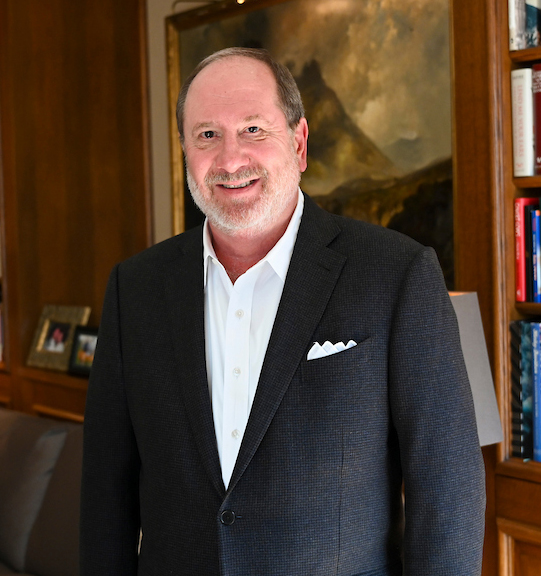
“What this program does is allow the students, on an accelerated basis, to see a good
foundational level of all aspects of development ... By coming in and doing this quickly,
students are able to understand the principles, the terminology, and the best practices.””
The Harbert College of Business is dedicated to providing relevant, forward-looking,
and engaging curricula, instruction, and high-impact experiential learning opportunities.
Here’s the mission: develop a comprehensive real estate proposal that turns 60 acres
of an 11,000-acre resort community into a retirement community in central Georgia.
Here’s another mission: create a vibrant public square with mammoth television screens
in a work-play environment that mixes office space, self-storage, hotel rooms, retail,
a fitness center and housing deep in the heart of midtown Atlanta.
Sounds like multi-million dollar projects for seasoned professionals. Well, they are.
Except projects such as these are concepts and the professionals are students in Auburn’s
Master of Real Estate Development program, which brings real-world projects into the classroom. Teams of students –
a mix of developers, and real estate professionals – strengthen their skills in a
holistic development environment in a collaborative program between the Harbert College of Business and the College of Architecture, Design and Construction. In this executive program, a professional doesn't have to leave his or her job to
come back to school -- they are advancing through the program, continuing to work
and have the abilities to apply their new-found skills on the job.
 “It’s very similar to real-world situations where you have a small period of time
to pair together groups of individual experts and try to come up with a game plan
to develop some real estate,” said Hobie Orton IV, 2013 graduate of the program, and
Development Partner at Madison Capital Group in Charleston, South Carolina.
“It’s very similar to real-world situations where you have a small period of time
to pair together groups of individual experts and try to come up with a game plan
to develop some real estate,” said Hobie Orton IV, 2013 graduate of the program, and
Development Partner at Madison Capital Group in Charleston, South Carolina.
Remember the great real estate crashes in the late 1980s and mid-2000s? Of course
you do. They cost developers and homeowners billions as market values fall by more
than 30 percent. Major banks and development firms failed, and the entire savings
and loan industry collapsed. Commercial properties and homes fell into foreclosure
while the federal government took measures to bail big banks out of misery.
Some problems could have been prevented, however, and well-rounded realtors and developers
might have been the answer.
“During my career, I saw a lot of the ups and downs – a lot of boom and bust cycles
-- of the real estate industry,” said Greg Winchester, a veteran real estate lender
and financial services firm owner from Milton, Georgia. “But a lot of mistakes could
have been avoided by young developers if they had the proper education and training
that a program like Auburn’s Master of Real Estate and Development offers.
“Historically, a lot of developers ended up in the business because they started out
in one area – decided to take the risk – but didn’t have the foundational training
in the disciplines that developers need.”
 |
Greg Winchester, Head of Industry and Alumni Relations.
|
Winchester, former co-CEO of Trimont Real Estate Advisors, was introduced to the late
Dr. Harris Hollans -- a finance professor in the Harbert College of Business who specialized
in real estate, and that introduction led Winchester to Auburn’s Master of Real Estate
and Development program, where he now serves as adjunct instructor and Head of Industry
and Alumni Relations.
The program has trained dozens of industry professionals since its inception – contractors
who don’t understand the real estate angle of the business, or someone from the legal
side of the business who doesn’t understand the nuances of design and building construction.
Auburn MRED students are professional contractors, acquisition officers, realtors,
lenders, developers, etc. and they are immersed in the complete study of the industry,
not one specialty.
“In my mind, this is a way to bring more professionalism to the industry and hopefully
avoid some of the severe problems we’ve seen in the past,” Winchester added. “What
this program does is allow the students, on an accelerated basis, to see a good foundational
level of all aspects of development. Whereas, if you’re out operating on your own,
you might know one or two different areas well, but then you’re just learning on the
job. By coming in and doing this quickly, students are able to understand the principles,
the terminology, and the best practices.”
Whether it’s a development in Barcelona, or a multi-million dollar, mixed-use development
in downtown Birmingham, students use their business and development savvy to draw
proposals and plans.
“Development is not a linear path. It’s often multi-dimensional, and because you are
dealing with real property, there’s always different issues and challenges that have
to be solved. Our students deal with typically very complex, mixed use projects and
they’re having to learn how to bring it all together in a short time – and make the
numbers work.””
“This teaches our young professionals to research and solve problems,” Winchester
said.
“Development is not a linear path. It’s often multi-dimensional, and because you are
dealing with real property, there’s always different issues and challenges that have
to be solved. Our students deal with typically very complex, mixed use projects and
they’re having to learn how to bring it all together in a short time – and make the
numbers work.”
 The diverse group of student professionals have the opportunity to feed and learn
off of each other’s industry knowledge. This is important heading back into the field,
Winchester noted. “When they’re in the program, they learn how to work with people
from other disciplines of real estate, which is really how development works in the
real world.”
The diverse group of student professionals have the opportunity to feed and learn
off of each other’s industry knowledge. This is important heading back into the field,
Winchester noted. “When they’re in the program, they learn how to work with people
from other disciplines of real estate, which is really how development works in the
real world.”
What makes Auburn’s program unique? It’s not an architecture program. It’s not a real
estate finance program. It’s not a development program, either. “Our program is a
unique collaboration between two colleges, the College of Business and the College
of Architecture, Design and Construction, so the program is able to draw upon professors
in both colleges who are high-level academics and practitioners in both fields. It’s
the best of both worlds.”
Robert Ferrara, a 2014 Auburn MRED alum and Asset Manager at Campus Realty Advisors,
LLC, in Atlanta, said the hands-on education allows professionals to work on projects
with a variety of sizes while solving a variety of issues. “Being able to go through
the processes … you can use the same processes on a small development by finding out
your permitting, zoning, building your models, and putting together a full presentation
because you’re essentially going to have to make a presentation to investors on any
project you do. It refines your skills.”
For more information about Auburn's Master of Real Estate Development program, visit https://harbert.auburn.edu/degrees-programs/graduate/masters-real-estate-development/index.html


 Degrees & Programs
Degrees & Programs
 Faculty & Staff
Faculty & Staff
 Career Development
Career Development
 Recruiters & Industry
Recruiters & Industry

 “It’s very similar to real-world situations where you have a small period of time
to pair together groups of individual experts and try to come up with a game plan
to develop some real estate,” said Hobie Orton IV, 2013 graduate of the program, and
Development Partner at Madison Capital Group in Charleston, South Carolina.
“It’s very similar to real-world situations where you have a small period of time
to pair together groups of individual experts and try to come up with a game plan
to develop some real estate,” said Hobie Orton IV, 2013 graduate of the program, and
Development Partner at Madison Capital Group in Charleston, South Carolina.
 The diverse group of student professionals have the opportunity to feed and learn
off of each other’s industry knowledge. This is important heading back into the field,
Winchester noted. “When they’re in the program, they learn how to work with people
from other disciplines of real estate, which is really how development works in the
real world.”
The diverse group of student professionals have the opportunity to feed and learn
off of each other’s industry knowledge. This is important heading back into the field,
Winchester noted. “When they’re in the program, they learn how to work with people
from other disciplines of real estate, which is really how development works in the
real world.”


